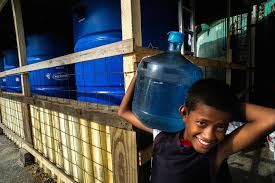$3million grant approved by ADB supporting water supply and sanitation in Ebeye
- November 10, 2020
- Posted by: Lyn Wilson
- Category: Corporate, Investment and Finance, Water Treatment, Asia

A $3 million grant has been approved by the Asian Development Bank (ADB) to enhance access to safe water and sanitation and to diminish waterborne diseases in Ebeye. The grant from ADB’s Special Funds Resources (Asian Development Fund) will help fund the project which is set to run until 2022.
In 2015 ADB approved a grant of $5 million from its Asian Development Fund and the administration of a grant of $4 million from the Government of Australia for the current project.
Ebeye is the second-largest urban center of the Marshall Islands with about 9,200 inhabitants living within 31 hectares making it one of the most densely populated areas in the Pacific. This populous island is also highly vulnerable to many waterborne diseases and other transmissible diseases, including COVID-19.
Stephen Blaik Principal Urban Development Specialist of ADB’s Pacific Regional Department said:
“The additional financing sought by the government will strengthen the sustainability of the current Ebeye Water Supply and Sanitation Project and increase the project benefits.” He added: “The project will also help build awareness of basic hygiene practices to raise public health standards, which is critical during the COVID-19 pandemic.”
The overall project remains a high priority of the government. It is aligned with the Marshall Islands’ water and sanitation policy objectives, as articulated in its draft National Strategic Plan 2020–2030.
The project also aligns with the operational priorities of ADB’s Strategy 2030 some of which are as follows:
- Tackling climate change
- Building climate and disaster resilience
- Enhancing environmental sustainability
- Strengthening governance and institutional capacity
ADB is dedicated to achieving a prosperous, inclusive, robust, and sustainable Asia and Pacific region, while also sustaining its efforts to eradicate extreme poverty in those areas.
